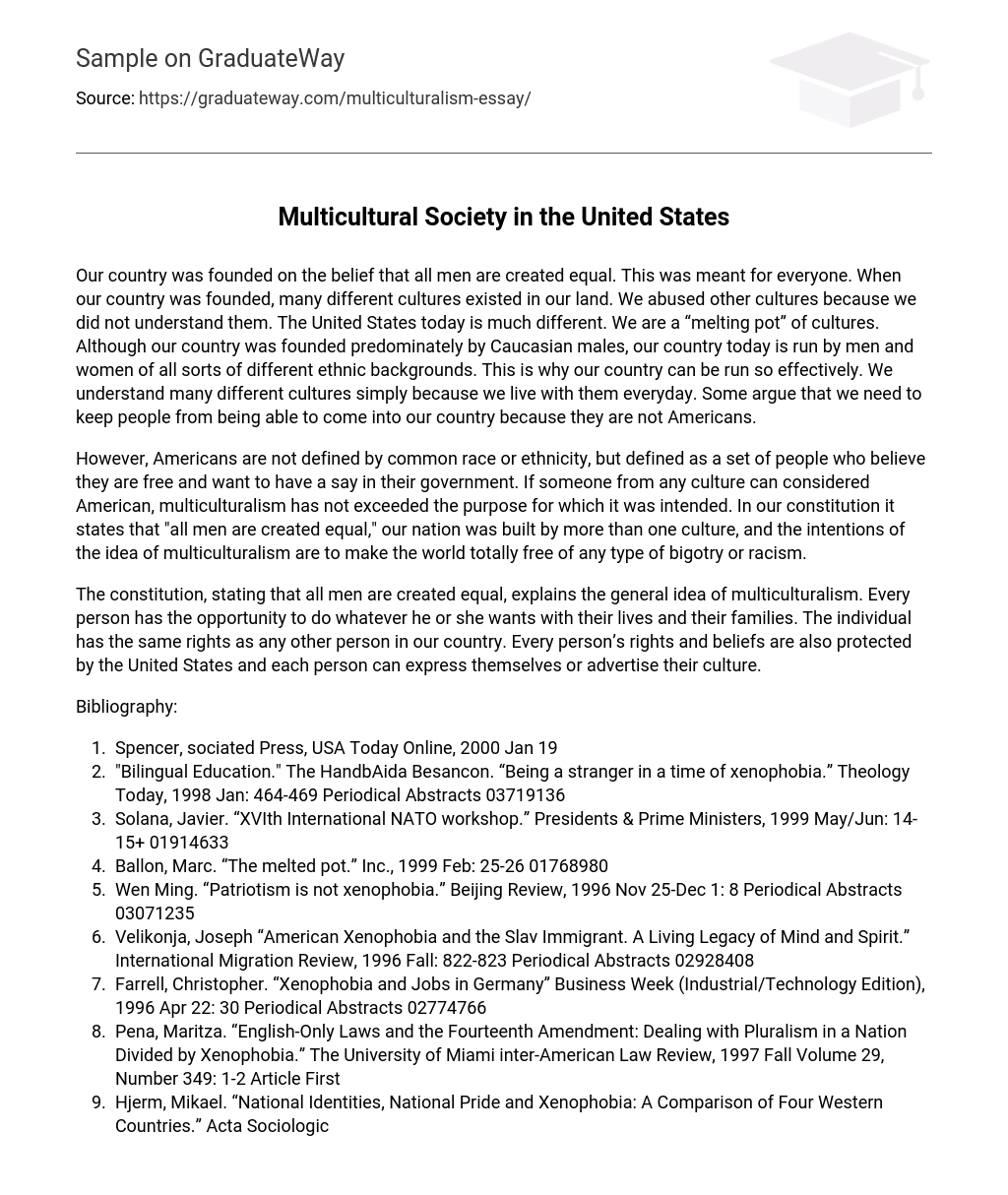Our country was founded on the belief that all men are created equal. This was meant for everyone. When our country was founded, many different cultures existed in our land. We abused other cultures because we did not understand them. The United States today is much different. We are a “melting pot” of cultures. Although our country was founded predominately by Caucasian males, our country today is run by men and women of all sorts of different ethnic backgrounds. This is why our country can be run so effectively. We understand many different cultures simply because we live with them everyday. Some argue that we need to keep people from being able to come into our country because they are not Americans.
However, Americans are not defined by common race or ethnicity, but defined as a set of people who believe they are free and want to have a say in their government. If someone from any culture can considered American, multiculturalism has not exceeded the purpose for which it was intended. In our constitution it states that “all men are created equal,” our nation was built by more than one culture, and the intentions of the idea of multiculturalism are to make the world totally free of any type of bigotry or racism.
The constitution, stating that all men are created equal, explains the general idea of multiculturalism. Every person has the opportunity to do whatever he or she wants with their lives and their families. The individual has the same rights as any other person in our country. Every person’s rights and beliefs are also protected by the United States and each person can express themselves or advertise their culture.
Bibliography:
- Spencer, sociated Press, USA Today Online, 2000 Jan 19
- “Bilingual Education.” The HandbAida Besancon. “Being a stranger in a time of xenophobia.” Theology Today, 1998 Jan: 464-469 Periodical Abstracts 03719136
- Solana, Javier. “XVIth International NATO workshop.” Presidents & Prime Ministers, 1999 May/Jun: 14-15+ 01914633
- Ballon, Marc. “The melted pot.” Inc., 1999 Feb: 25-26 01768980
- Wen Ming. “Patriotism is not xenophobia.” Beijing Review, 1996 Nov 25-Dec 1: 8 Periodical Abstracts 03071235
- Velikonja, Joseph “American Xenophobia and the Slav Immigrant. A Living Legacy of Mind and Spirit.” International Migration Review, 1996 Fall: 822-823 Periodical Abstracts 02928408
- Farrell, Christopher. “Xenophobia and Jobs in Germany” Business Week (Industrial/Technology Edition), 1996 Apr 22: 30 Periodical Abstracts 02774766
- Pena, Maritza. “English-Only Laws and the Fourteenth Amendment: Dealing with Pluralism in a Nation Divided by Xenophobia.” The University of Miami inter-American Law Review, 1997 Fall Volume 29, Number 349: 1-2 Article First
- Hjerm, Mikael. “National Identities, National Pride and Xenophobia: A Comparison of Four Western Countries.” Acta Sociologica, 1998 Volume 41, Number 4: 335 Article First
- Keigher, Sharon M. “National Health Line: America’s Most Cruel Xenophobia.” Health & Social Work, 1997 Volume 22, Number 3: 232 Article First
- Echebarria, Echabe. A. “Images of Immigrants: A Study on the Xenophobia and Permeability of Inter-group Boundaries.” European Journal of Social Psychology, 1996 Volume 26, Number 3: 341 Article First
- Owens, Kenneth N. “Seeing the Elephant Through Yankee Spectacles” Reviews in American History, 1999 Volume 27, Number 1: 52-57 Project Muse
- Markus, Andrew. “Attitudes Towards Immigration and National Identity: A Re- Awakening of Xenophobia?” Ethnic Times, 1999 Volume 7, Number 3: 39 Carl Uncover
- Wimmer, Andreas. “Explaining Xenophobia and Racism: A Critical Review of Current Research Approaches.” Ethnic and racial studies, 1997 Jan 1 Volume 20, Number 1: 17 Carl Uncover
- Banton, Michael. “The cultural determinants of xenophobia.” Anthropology today, 1996 April 1 Volume 12, Number 2: 8
- Reddin, Mike. “Danger Abroad! Our Concerns Are Often Another Display of Xenophobia.” Transitions Abroad, 1996 March 1 Volume 19, Number 5: 97
- Gillespie, Mark. “U.S. Public Changing Views On Immigration” Gallup News Service, 1999 March 16 The Gallup Organization, Princeton; Accessed Sunday, February 20, 2000
- “Candidates Thoughts on Race Issues” Associated Press, Washington Post Online, (Printed in Washington Post on Sunday, Feb. 20, 2000; 1:25 p.m. EST)
- “On The Issues: Immigration” Asook of Texas Online, Accessed Sunday, February 20, 2000. (Originally printed in “Handbook of Texas”)
- “Adding and Subtracting- IMMIGRATION.” Dentzer, Susan. U.S. News, 1996 March 4





